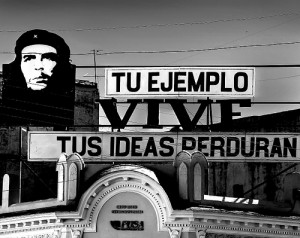Impact Mindfulness is an ideal and Revolutionary Misfits are idealists.
But it is not an ideology, nor are misfits ideologues.
So, what’s the difference?
Today I get to be lazy (again) by reaching way back into the CRG archives to pull out a post on being an idealist versus an ideologue.
Let me know what you think…
Idealist or Ideologue?
I have, on rare occasion, been accused of being a conservative. I guess that’s because I have, again on rare occasion, agreed with “conservative” ideals.
But then at other times, I can be found agreeing with “liberal” ideals.
This morning I find myself asking…myself…this question, what exactly do I believe?
That has me thinking about ideals, because I consider myself to be an “idealist,”…
but not an “ideologue.”
And there is a big difference.
Ideologue, on the other hand is defined as an often blindly partisan advocate or adherent of a particular ideology.
I like to think of myself as an idealist who believes that there is a spark of good that can be found in every human being. At times that spark can be snuffed out or suffocated by the events of one’s life, but it is there and under the right circumstances can ignite and even turn into an unquenchable flame.
I guess I am a conservative as well, but only in the sense that I believe in the conservation of human life and of our planet, regardless of the perceived “costs” of doing so.
But let me get back to this idealist versus ideologue dichotomy.
Below are ten distinctions that separate the idealist from the ideologue…
- An idealist gives people the freedom to believe what they believe without passing judgment. An ideologue condemns any belief that is not consistent with his or her own.
- An idealist sees the potential for good in people. An ideologue believes that the capacity for doing good only exists when one marches in lockstep with the ideology.
- An idealist believes that every human being has the right to find their own happiness. An ideologue believes that happiness only exists within the confines of adherence to the ideology.
- An idealist believes that there should be a “level playing field,” i.e., equal opportunity for all people. An ideologue believes that there should be a level playing field only for those that are “on their ideological team.”
- An idealist understands that people do what they do for a reason and that it is best to try to understand that reason, rather than pass judgment on it. An ideologue believes that any action taken contrary to their ideology is stupid, immoral, or wrong and should be roundly condemned.
- An idealist, for the most part, takes a positive view of life and life’s circumstances. An ideologue believes that all life’s events that they perceive as “bad” are just consequences of non-adherence to the ideology.
- An idealist believes that every person has the capacity to make a difference. An ideologue believes that outside the ideology people only have the capacity to screw up.
- An idealist believes that the world can be a better place. An ideologue believes that the world is going to hell in a hand-basket as a consequence of non-adherence to the ideology.
- An idealist, for the most part maintains a non-critical spirit and tries to uplift and support people, whatever ideals they may hold. An ideologue believes that non-adherents to the ideology should “get what’s coming to them.”
- An idealist would never use violence or coercion in order to win converts to the ideals that he or she holds. An ideologue will.
I have written in the past about Che Guevara, the Marxist revolutionary. In the movie and in the book, The Motorcycle Diaries, the young Che was an idealist. He believed in a better world and that revolution was the means to achieve it.
Martin Luther King was also an idealist and a revolutionary. He too believed in a better world and that revolution was the means to achieve it.
Martin Luther King never made that transformation and the results he achieved, passively, surpass, at least in memory, those of Guevara’s.
Growing up in the fundamentalist Christian culture that predominates in the southern U.S., I often heard that any belief system contrary to an adherence to a literary interpretation of scripture was idolatry. That outside of that belief system, humans had no capacity for good whatsoever.
But doesn’t that defy logic?
Was Mohandas Gandhi a fundamentalist Christian? Did he not have the capacity for good?
There has been so much evil propagated in this world by ideologues. I would even go so far as to coin a new word that describes their warped brand of idealism, what I would call id-ea-olatry.
image credit: Modest Janicki (Modest and Jill) via Compfight cc

[…] was also a guy onboard named Ernest “Che” Guevara. I’ve written quite a lot about Che Guevara in this […]